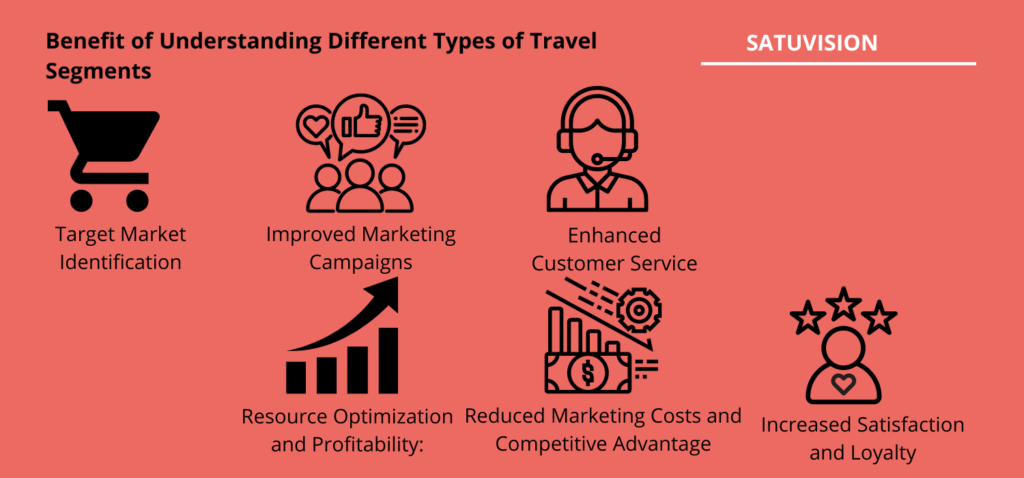What are Travel Segments?
Travel segments include families, groups, businesses, and leisure travelers. Running a hospitality business means you must understand each travel segment carefully. Understanding why people travel, how they like to travel, and what they like to do when they travel can help you better personalize your products or services and marketing approach.
In this blog, we will explore various travel segments and provide a guide to understanding the different types of travel. We will also discuss whether to create a personalized product or service or specific marketing strategies for each segment.
Table of Contents
The benefit of Understanding Different Types of Travel Segments

Understanding different types of travel segments can benefit travel businesses in several ways:
- Target Market Identification: Tailor your products and services to meet the needs of specific travel segments. This will allow you to identify and focus on your target audience effectively.
- Improved Marketing Campaigns: Create personalized and targeted marketing campaigns that align with each segment, leading to more effective communication and increased engagement.
- Enhanced Customer Service: Anticipate the needs of your guests better by understanding their preferences, resulting in more customized and attentive service, thus improving overall guest satisfaction and loyalty.
- Increased Satisfaction and Loyalty: Catering to the unique preferences of different segments can enhance guest satisfaction, leading to higher customer retention and loyalty rates.
- Reduced Marketing Costs and Competitive Advantage: Optimize your marketing efforts by targeting the most profitable segments, reducing costs while gaining a competitive edge in the market.
- Resource Optimization and Profitability: Allocate your resources efficiently by prioritizing the most profitable segments, maximizing profitability and achieving better investment returns.
Read also: 11 Tips How to Increase Hotel Revenue that Hoteliers Need to Know
Types of Travel Segments in the Hospitality Industry
Here are several types of travel segments in the tourism industry you need to know and understand:
Business Travelers
Business travelers look for efficiency and comfort. They value services that enhance productivity, such as fast check-ins, reliable internet, and convenient business facilities. According to surveys, 87 percent of travelers consider that the quality of their business trips affects the results of their work.
Deep Dive into Business Travel Needs:
- Efficiency is Key: You need to ensure that business travelers can effortlessly access easy transportation and streamlined services to maintain their work schedules.
- Loyalty Programs: You must implement reward systems that provide value to frequent business travelers, encouraging repeat visits.
Leisure Travelers
Leisure travelers seek relaxation and immersion in local cultures and experiences. They range from luxury seekers to those desiring authentic local stays.
Exploring Leisure Traveler Preferences:
- Diverse Offerings: You can provide options from luxury amenities to local cultural tours.
- Partner with Local Businesses: You can create unique experiences by collaborating with local artisans, restaurants, and cultural sites.
Wellness Travelers
Do you know that Wellness travelers are a growing segment? Wellness tourism is expected to grow more than any other wellness sector, increasing by about 21% by 2025. This travel segment often seeks destinations that promote health and well-being. This segment tends to be highly engaged and willing to spend more on experiences that enhance their mental and physical health.
Tips for Attract Wellness Travelers:
- You can offer spa treatments, yoga classes, and wellness retreats to satisfy their desire for relaxation.
- Highlight peaceful surroundings, such as tranquil gardens or scenic views, to create a soothing atmosphere.
- Provide your guests with health-focused amenities, such as fitness centers or healthy dining options, to align with their wellness goals.
- Offer personalized wellness programs or activities, such as guided meditation or nutrition workshops.
FREE RESOURCE: Sustainable Travel and Tourism Guide for Responsible Exploration and Adventure
Budget Travelers
While budget-conscious, these travelers do not compromise on quality. They review and look for the best deals. A recent report highlighted that over 70% of budget travelers rely on online reviews and social media recommendations when planning their trips.
Story of a Budget Traveler’s Journey:
Imagine a tech-savvy traveler using digital tools to plan a cost-effective trip. They look for honest reviews and value transparency in pricing, seeking out the best experiences within their budget. You can attract them by offering transparent pricing, value-for-money packages, and leveraging digital marketing strategies.
Families
Family travelers represent a significant market, often seeking destinations catering to adults and children. This segment tends to stay longer and spend more, with 54% planning trips to family-friendly locations this year.
Tips for Engaging Family Travelers:
- Personalize Your Offerings: Tailor your marketing strategies to highlight family-friendly features like child-proof rooms or family entertainment services.
- Enhance Convenience: Provide your hotel’s amenities that simplify travel for families, such as on-site childcare or family dining options.
Group travelers
- What is group Travelers: Travelers who plan to travel with a group of friends or as a couple
- Growing Trend: Studies show that group travel is thriving as more people choose to have journeys together, particularly with the flexibility of rising disposable incomes, especially in developing countries.
- Tailored Services Needed: To enhance their experience, you can offer group discounts and plan activities related to group dynamics.
Solo Travelers
- Solo travelers: These people choose to explore new destinations on their own, driven by a desire for independence, self-discovery, and the freedom to create their own itinerary.
- Increasing Popularity: Solo travel is becoming more popular, with 25% planning solo trips, up from 15% in previous years.
- Personalized Experiences: To attract solo travelers, you must focus on safety and tailored experiences like social events and custom tours.
Eco Travelers
Eco travelers are environmentally conscious individuals who seek sustainable, nature-focused travel experiences. This segment values eco-friendly accommodations and activities.
A survey found that 61% of respondents said the pandemic has made them want to travel more sustainably. And in the future, 79% want to move around in a more environmentally friendly way while on holiday
Tips for Engaging Eco Travelers:
- Showcase your hotel’s green initiatives, such as energy-efficient practices or waste reduction programs, to appeal to their eco-friendly values.
- Provide information about local conservation efforts or offer eco-tours to engage them in sustainable activities.
- Create opportunities for eco travelers to connect with nature, such as guided hikes, wildlife tours, or eco-friendly adventure activities.
- Promote outdoor amenities, like natural pools or scenic trails, to enhance their experience with nature-focused relaxation or exploration.
Conclusion
Understanding travel segments is crucial for any hospitality business looking to enhance customer satisfaction, loyalty, and profitability. By dividing travelers into different types, such as business travelers, leisure travelers, and eco travelers, your hotel business can better personalize your products, services, and marketing approaches. The benefits of segmenting travelers include improved marketing campaigns, enhanced customer service, and increased competitive advantage. Each segment, from families to solo travelers, has unique needs and preferences, providing opportunities for businesses to tailor their offerings accordingly. By aligning offerings with the specific needs of each segment, businesses can foster stronger customer relationships and stand out in the competitive travel industry.
Frequently Asked Questions
Travel segments categorize customers into specific groups according to their requirements, preferences, behaviors, and demographic characteristics. These segments enable businesses to customize their marketing strategies and create specialized products and services for each group.
For instance, if you manage a hospitality business, you could categorize your audience based on their travel preferences, such as family, group, busniess traveler and etc.
SATUVISION breathe life into brands. As a premier branding agency, our brand strategy services will combine industry insights with creative acumen to define and shape your brand identity, aligning it with your values, mission, and vision.





